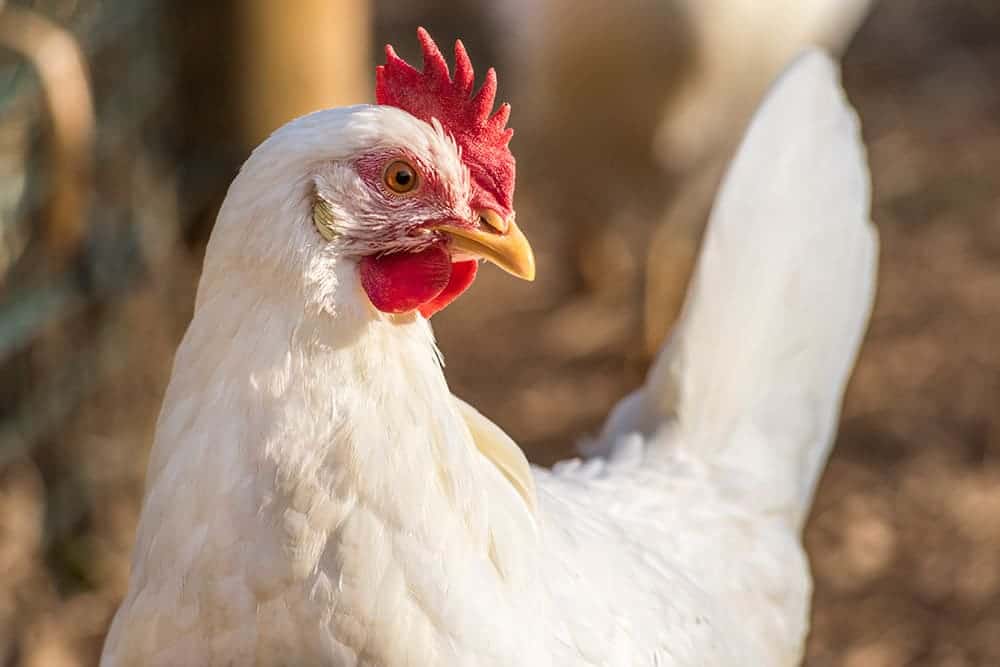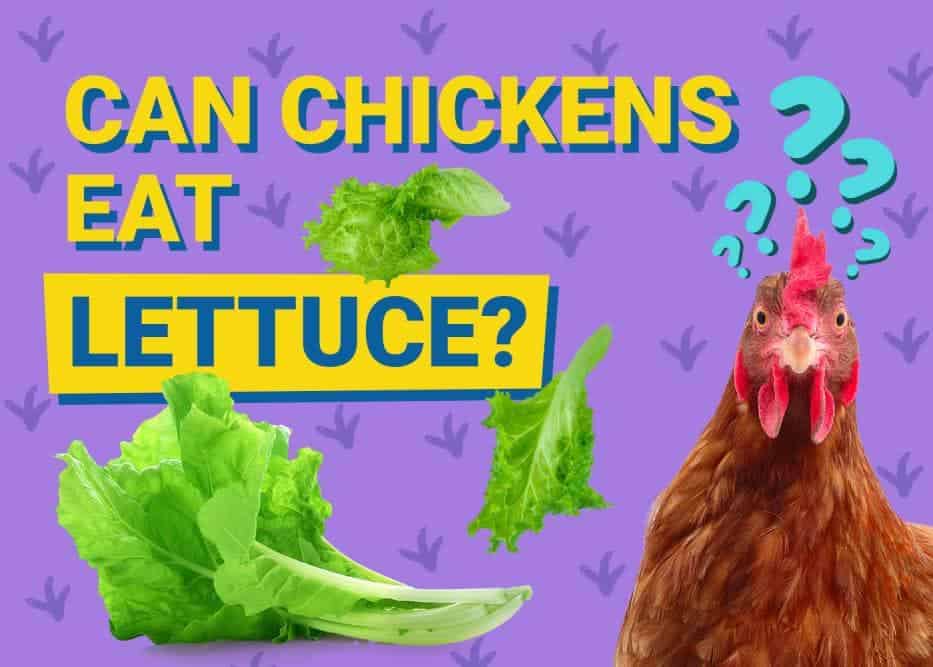Approved by Dr. Paola Cuevas
Chickens are known for their ability as scavengers. They are very good at finding food in most cases, though some breeds aren’t particularly good at scavenging food. Typically, you can feed chickens many scraps from your kitchen, which allows you to recycle food and feed your chickens at the same time.
However, chickens can’t eat everything from your kitchen. There are several substances we commonly eat that are toxic to chickens—or, at least, unhealthy.
Luckily, chickens can eat lettuce. While it is high in water, it is also green. Therefore, it does provide many different nutrients to your chickens. When fed in moderation with other foods, it can work very well for your chicken.
With that said, there are some types of lettuce that you should look out for.

What Lettuce Can Chickens Not Eat?
Chickens can eat any type of lettuce but iceberg lettuce. This is because iceberg contains more lactucarium, a sedative, milk-like substance secreted by the stem. Additionally, Iceberg lettuce has more water content, fewer nutrients, and less fiber than other varieties, when eaten in large amounts, this can cause stomach upset and diarrhea.
While stomach upset usually doesn’t cause huge problems, it can potentially be deadly for some animals. Severe diarrhea can cause dehydration, which is especially troublesome for older and younger animals.
Therefore, you should avoid feeding chickens iceberg lettuce. All other sorts are perfectly fine, however.

How Much Lettuce Can Chicken Eat?
Lettuce would fall into the “treats” category. They work to add nutrients to your chicken’s food and increase the diversity of their diet. However, you should preferably feed your chickens complete feed for the most part. This food contains everything they need, which is why your chicken needs to consume it for the most part.
However, treats can also be helpful. As natural foragers, chickens will automatically look for snacks and other food to bolster their usual diet.
You should vary these treats as much as possible, though. You don’t want to only give your chicken lettuce—just like we don’t need to only consume lettuce. Mix lettuce with other ingredients to ensure that your chicken is getting a varied diet with many different vitamins and minerals.
Why Can’t Chickens Have Iceberg Lettuce?
Chickens cannot have iceberg lettuce because it contains high amounts of lactucarium. This substance isn’t necessarily toxic to chickens, but it has sedative effects. However, Iceberg lettuce can cause stomach upset if they eat too much of it.
Furthermore, iceberg lettuce is mostly water. Therefore, it doesn’t contain high amounts of vitamins or minerals. Instead, the chicken will fill up on mostly water. This isn’t necessarily a bad thing in warmer climates where your chickens may have a hard time staying hydrated. However, usually, we don’t recommend letting your chicken snack on iceberg lettuce. (Plus, iceberg lettuce can cause diarrhea, which can make hydration problems worse.)

Can Chickens Eat All Types of Lettuce?
Chickens can generally eat any type of lettuce. However, iceberg lettuce is the exception to this rule.
Of course, your chickens cannot live on only lettuce. It isn’t particularly nutritious and full of lots of water. This isn’t necessarily bad when fed in small amounts. However, in some cases, it can become extremely troublesome. You don’t want your chickens only filling up on water, after all.
Watercress, rocket, and mizuna lettuce are particularly nutritious and helpful for chickens. However, romaine and other common types of lettuce are typically perfectly fine occasionally, as well.
What Vegetables Cannot be Fed to Chickens?
Typically, veggies are considered to be healthy and nutritious. However, there are some veggies that you should avoid feeding your chicken at all. Not all veggies are made equal.
- Potatoes: All potatoes contain a toxin called Solanine, which can affect the nervous system. All parts of the potato plant are potentially toxic, especially the green parts and skin, don’t let them eat the leaves or stems, either. (Sweet potatoes do not fall in this category, as they are not technically a potato.)
- Avocadoes: While not technically a veggie, they are toxic to chickens. The pits and skin contain a toxin called Persin, which can be fatal. However, the fleshy parts are okay in moderation.
- Onions, chives, and garlic: These spices are okay in very small amounts, similar to the amounts used to season food. However, they will affect the flavor of the eggs they produce (and not in a good way). Furthermore, they can cause anemia in high amounts.
- Rhubarb leaves: These contain oxalic acid, which causes calcium deficiency. While a little bit once is okay, you shouldn’t feed it regularly, as it can cause kidney failure.
- Rotten veggies: Overripe veggies are fine. However, they should not be fed anything moldy or rotten. If you wouldn’t eat it, then you should feed it to your chicken, either.
What Vegetables Can Chickens Eat?
Chickens can eat a wide range of veggies. Most are okay for your chicken, in fact. When in doubt, it is best to look at a list of what chickens can’t eat, as this is far shorter than the list that they can eat. Still, here is a list of some common veggies that are a good option for your chicken:
- Asparagus
- Broccoli
- Brussels sprouts
- Cabbage
- Carrots
- Cauliflower
- Celery
- Cooked beans
- Corn
- Cucumbers
- Garlic
- Green beans
- Kale
- Lettuce
- Peas
- Peppers
- Potato Skins
- Potatoes (sometimes)
- Pumpkins
- Radishes
- Spaghetti Squash
- Spinach
- Sweet potatoes
- Tomatoes
- Zucchini

Conclusion
Most types of lettuce are completely fine for chickens. However, there are some varieties that should be avoided. For instance, iceberg lettuce can cause problems in high amounts, as it can cause stomach upset. For this reason, we recommend avoiding iceberg lettuce. However, all other sorts of lettuce are a great option when fed in moderation.
Furthermore, many types of veggies are completely fine for your chicken to eat, as well. There are a few options that should be avoided, like green potatoes. However, the list of what your chicken can’t eat is much smaller than the list of what they can eat.
See also:
- 30 Alternative Feed Options for Chickens: Items Found at Home
- 10 Best Organic Chicken Feed Brands – Reviews & Top Picks
